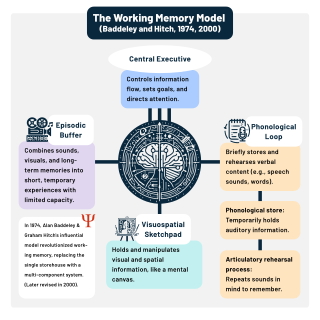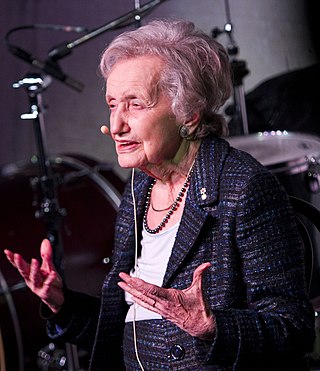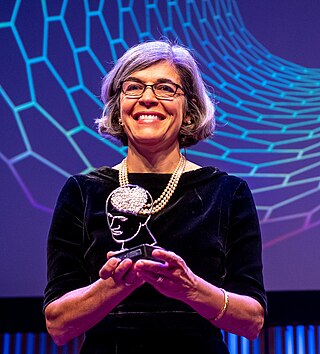
Working memory is a cognitive system with a limited capacity that can hold information temporarily. It is important for reasoning and the guidance of decision-making and behavior. Working memory is often used synonymously with short-term memory, but some theorists consider the two forms of memory distinct, assuming that working memory allows for the manipulation of stored information, whereas short-term memory only refers to the short-term storage of information. Working memory is a theoretical concept central to cognitive psychology, neuropsychology, and neuroscience.

Brenda Milner is a British-Canadian neuropsychologist who has contributed extensively to the research literature on various topics in the field of clinical neuropsychology. Milner is a professor in the Department of Neurology and Neurosurgery at McGill University and a professor of Psychology at the Montreal Neurological Institute. As of 2020, she holds more than 25 honorary degrees and she continued to work in her nineties. Her current work covers many aspects of neuropsychology including her lifelong interest in the involvement of the temporal lobes in episodic memory. She is sometimes referred to as the founder of neuropsychology and has been essential in its development. She received the Balzan Prize for Cognitive Neuroscience in 2009, and the Kavli Prize in Neuroscience, together with John O'Keefe, and Marcus E. Raichle, in 2014. She turned 100 in July 2018 and at the time was still overseeing the work of researchers.

Margaret Ann Boden is a Research Professor of Cognitive Science in the Department of Informatics at the University of Sussex, where her work embraces the fields of artificial intelligence, psychology, philosophy, and cognitive and computer science.

Alan David Baddeley CBE FRS is a British psychologist. He is known for his research on memory and for developing the three-component model of working memory. He is a professor of psychology at the University of York.

Lisa Feldman Barrett is a Canadian-American psychologist. She is a University Distinguished Professor of psychology at Northeastern University, where she focuses on affective science and co-directs the Interdisciplinary Affective Science Laboratory. She has received both of the highest scientific honors in the field of psychology, the William James Fellow Award from the Association for Psychological Science for 2025, and the Award for Distinguished Scientific Contributions from the American Psychological Association for 2021. Along with James Russell, she is the founding editor-in-chief of the journal Emotion Review. Along with James Gross, she founded the Society for Affective Science.

Dame Uta Frith is a German-British developmental psychologist and emeritus professor in cognitive development at the Institute of Cognitive Neuroscience at University College London (UCL). She pioneered much of the current research into autism and dyslexia. Her book Autism: Explaining the Enigma introduced the cognitive neuroscience of autism. She is credited with creating the Sally–Anne test along with fellow scientists Alan Leslie and Simon Baron-Cohen. Among students she has mentored are Tony Attwood, Maggie Snowling, Simon Baron-Cohen and Francesca Happé.

Brain training is a program of regular activities purported to maintain or improve one's cognitive abilities. The phrase “cognitive ability” usually refers to components of fluid intelligence such as executive function and working memory. Cognitive training reflects a hypothesis that cognitive abilities can be maintained or improved by exercising the brain, analogous to the way physical fitness is improved by exercising the body. Cognitive training activities can take place in numerous modalities such as cardiovascular fitness training, playing online games or completing cognitive tasks in alignment with a training regimen, playing video games that require visuospatial reasoning, and engaging in novel activities such as dance, art, and music.

Anna Christina Nobre FBA, MAE, fNASc is a Brazilian and British cognitive neuroscientist working at Yale University in New Haven, CT, USA.

Helen J. Neville was a Canadian psychologist and neuroscientist known internationally for her research in the field of human brain development.
Dame Victoria Geraldine Bruce,, known as Vicki Bruce, is an English psychologist, Professor of Psychology and former Head of the School of Psychology at Newcastle University. She is known for her work on human face perception and person memory, including face recognition and recall by eyewitnesses and gaze. and other aspects of social cognition. She is also interested in visual cognition more generally. She was made a Dame in the 2015 Birthday Honours list.
Barbara Jacquelyn Sahakian, is professor of clinical neuropsychology at the department of psychiatry and Medical Research Council (MRC)/Wellcome Trust Behavioural and Clinical Neuroscience Institute, University of Cambridge. She is also an honorary clinical psychologist at Addenbrooke's Hospital, Cambridge. She has an international reputation in the fields of cognitive psychopharmacology, neuroethics, neuropsychology, neuropsychiatry and neuroimaging.

Eleanor Anne Maguire is an Irish neuroscientist. Since 2007, she has been Professor of Cognitive Neuroscience at University College London where she is also a Wellcome Trust Principal Research Fellow.

Francesca Gabrielle Elizabeth Happé is Professor of Cognitive Neuroscience and Director of the MRC Social, Genetic and Developmental Psychiatry Centre at the Institute of Psychiatry, Psychology and Neuroscience, King's College London. Her research concerns autism spectrum conditions, specifically the understanding social cognitive processes in these conditions.

Professor Susan Lea is a chartered psychologist and academic, and was Vice-Chancellor at the University of Hull from 2017 to 2022. Previously she was Deputy Vice-Chancellor (Academic) at the University of Greenwich.

Sarah-Jayne Blakemore is Professor of Psychology and Cognitive Neuroscience at the University of Cambridge and co-director of the Wellcome Trust PhD Programme Neuroscience at University College London.

Karalyn Eve Patterson is a British psychologist in Department of Clinical Neurosciences, University of Cambridge and MRC Cognition and Brain Sciences Unit. She is a specialist in cognitive neuropsychology and an Emeritus Fellow of Darwin College, Cambridge.

Sophie Kerttu Scott is a British neuroscientist and Wellcome Trust Senior Fellow at University College London (UCL). Her research investigates the cognitive neuroscience of voices, speech and laughter particularly speech perception, speech production, vocal emotions and human communication. She also serves as director of UCL's Institute of Cognitive Neuroscience.
Ann Phoenix, is a British psychologist and academic, whose research focuses on psychosocial issues related to identity. She is Professor of Psychosocial Studies at the Institute of Education, University College London. She was previously ESRC Professorial Fellow for the Transforming Experiences research programme. She was previously Co-Director of the Thomas Coram Research Unit, and Reader in Psychology at the Open University.
Usha Claire Goswami is a researcher and professor of Cognitive Developmental Neuroscience at the University of Cambridge, a Fellow of St. John's College, Cambridge, and the director of the Centre for Neuroscience in Education, Downing Site. She obtained her Ph.D. in developmental psychology from the University of Oxford before becoming a professor of cognitive developmental psychology at the University College London. Goswami's work is primarily in educational neuroscience with major focuses on reading development and developmental dyslexia.
Elizabeth Anya Phelps is the Pershing Square Professor of Human Neuroscience at Harvard University in the Department of Psychology. She is a cognitive neuroscientist known for her research at the intersection of memory, learning, and emotion. She was the recipient of the Social and Affective Neuroscience Society Distinguished Scholar Award and the 21st Century Scientist Award from the James S. McDonnell Foundation, as well as other honors and awards in her field. Phelps was honored with the 2018 Thomas William Salmon Lecture and Medal in Psychiatry at the New York Academy of Medicine. She received the 2019 William James Fellow Award from the Association for Psychological Science (APS) which acknowledged how her "multidisciplinary body of research has probed the influence of emotion across cognitive and behavioral domains using novel imaging techniques and neuropsychological studies grounded in animal models of learning."














